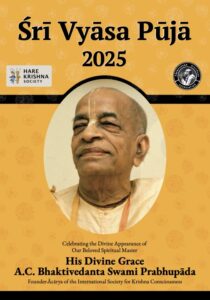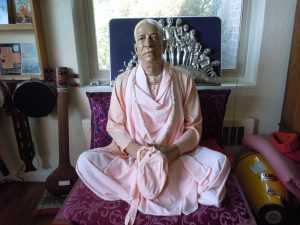Bg 8.5 purport–in this verse the importance of Kṛṣṇa consciousness is stressed. Anyone who quits his body in Kṛṣṇa consciousness is at once transferred to the transcendental abode of the Supreme Lord. The word smaran (remembering) is important. Remembrance of Kṛṣṇa is not possible for the impure soul who has not practiced Kṛṣṇa consciousness in devotional service. To remember Kṛṣṇa one should chant the mahāmantra, Hare Kṛṣṇa, Hare Kṛṣṇa, Kṛṣṇa Kṛṣṇa, Hare Hare/ Hare Rāma, Hare Rāma, Rāma Rāma, Hare Hare, incessantly, following in the footsteps of Lord Caitanya, being more tolerant than the tree, humbler than the grass and offering all respect to others without requiring respect in return. In such a way one will be able to depart from the body successfully remembering Kṛṣṇa and so attain the supreme goal.
BG 9.3-Those who are not faithful on the path of devotional service cannot attain Me, O conqueror of foes, but return to birth and death in this material world.
PURPORT
The faithless cannot accomplish this process of devotional service; that is the purport of this verse. Faith is created by association with devotees. Unfortunate people, even after hearing all the evidence of Vedic literature from great personalities, still have no faith in God. They are hesitant and cannot stay fixed in the devotional service of the Lord. Thus faith is a most important factor for progress in Kṛṣṇa consciousness. In the Caitanya-caritāmṛta it is said that one should have complete conviction that simply by serving the Supreme Lord Śrī Kṛṣṇa he can achieve all perfection. That is called real faith. ….
After reading Bhagavad-gītā one should promptly come to the conclusion of Bhagavad-gītā: one should give up all other engagements and adopt the service of the Supreme Lord, Kṛṣṇa, the Personality of Godhead. If one is convinced of this philosophy of life, that is faith. Now the development of that faith is the process of Kṛṣṇa consciousness.
There are three divisions of Kṛṣṇa conscious men. In the third class are those who have no faith. If they are engaged in devotional service officially, for some ulterior purpose, they cannot achieve the highest perfectional stage. Most probably they will slip, after some time. They may become engaged, but because they haven’t complete conviction and faith, it is very difficult for them to continue in Kṛṣṇa consciousness. We have practical experience in discharging our missionary activity that some people come and apply themselves to the Kṛṣṇa consciousness with some hidden motive, and as soon as they are economically a little well-situated, they give up this process and take to their old ways again. It is only by faith that one can advance in Kṛṣṇa consciousness. As far as the development of faith is concerned, one who is well versed in the literatures of devotional service and has attained the stage of firm faith is called a first-class person in Kṛṣṇa consciousness. And in the second class are those who are not very advanced in understanding the devotional scriptures but who automatically have firm faith that Kṛṣṇa bhakti or service to Kṛṣṇa is the best course and so in good faith have taken it up. Thus they are superior to the third class who have neither perfect knowledge of the scriptures nor good faith but by association and simplicity are trying to follow. The third-class person in Kṛṣṇa consciousness may fall down, but when one is in the second class or first class, he does not fall down. One in the first class will surely make progress and achieve the result at the end. As far as the third-class person in Kṛṣṇa consciousness is concerned, although he has faith in the conviction that devotional service to Kṛṣṇa is very good, he has no knowledge of Kṛṣṇa through the scriptures like Śrīmad-Bhāgavatam and Bhagavad-gītā. Sometimes these third-class persons in Kṛṣṇa consciousness have some tendency toward karma-yoga and jñāna-yoga, and sometimes they are disturbed, but as soon as the infection of karma-yoga or jñāna-yoga is vanquished, they become second-class or first-class persons in Kṛṣṇa consciousness.
BG 9.12-Those who are thus bewildered are attracted by demonic and atheistic views. In that deluded condition, their hopes for liberation, their fruitive activities, and their culture of knowledge are all defeated.
PURPORT–There are many devotees who assume themselves to be in Kṛṣṇa consciousness and devotional service but at heart do not accept the Supreme Personality of Godhead, Kṛṣṇa, as the Absolute Truth. For them, the fruit of devotional service-going back to Godhead-will never be tasted.
BG 10.2-Neither the hosts of demigods nor the great sages know My origin, for, in every respect, I am the source of the demigods and the sages.
PURPORT
As stated in the Brahma-saṁhitā, Lord Kṛṣṇa is the Supreme Lord. No one is greater than Him; He is the cause of all causes. Here it is also stated by the Lord personally that He is the cause of all the demigods and sages. Even the demigods and great sages cannot understand Kṛṣṇa; they can understand neither His name nor His personality, so what is the position of the so-called scholars of this tiny planet?
April 3 1975 Mayapur
If you think, “Now I have chanted my sixteen rounds. Now I’ve finished my business. Now I can do whatever nonsense I like,” no. Kṛṣṇa says no. Satata. Therefore we have to plan our life in such a way that we haven’t got any other engagement than service of Kṛṣṇa. This is required. ….. Unless you develop love for Kṛṣṇa, you cannot be engaged twenty-four hours. That is not possible. Therefore it is said, prīti-pūrvakam: not officially, but with love. If you acquire this qualification, then you will talk with Kṛṣṇa who is within your heart. Then you’ll talk. He is ready to talk, but He does not talk with rascals and fools. One must acquire the qualification to talk with Kṛṣṇa. Then you’ll be able to talk with Deity. Within your heart Kṛṣṇa is situated there. Anywhere you go, Kṛṣṇa is within you, and He’ll give you intelligence. ….
Mlecchas who do not get purifed-even after diksa
Antya 3.124
asamskrtah kriya-hina
rajasa tamasavrtah
prajas te bhaksayisyanti
mleccha rajanya-rupinah
“In the age of Kali, mlecchas, or lowborn people who have not
undergone the purifying process of samskara, who do not know how to
apply that process in actual life and who are covered by the modes of
passion and ignorance, will take the posts of administrators. They
will devour the citizens with their atheistic activities.” A person
who is not purified by the prescribed process of samskara is called
asamskrta, but if one remains kriya-hina even after being purified by
initiation–in other words, if one fails to actually apply the
principles of purity in his life–he remains an unpurified mleccha or
yavana.
Unless perfect cant remember Krsna at time of death-
Harikeśa: So if a devotee dies and remembers Kṛṣṇa, although he is not perfect…
Prabhupāda: Unless he is perfect, he cannot remember Kṛṣṇa. That is not possible. That is not possible. That is theory only. He must be perfect. Somehow or other, he fallen, so Kṛṣṇa gives him the chance. That is special concession for devotee. Some way or other, you become devotee. Even if you cannot finish the whole job, if you fall down, still, there is guarantee that you get your birth in a very good society. That is the prerogative.”
Srila Prabhupada’s Morning Walk conversation — November 2, 1975, Nairobi
Quotes on our real position not liberated
710211SB.GOR Lectures 230064/530501
Prabhupada: …raksanti tad-bhaktimatah parebhyo mattas ca martyan
atha sarvatas ca. So invisible Visnudutas, they are always traveling.
Just like Visnu, Lord Visnu, the Supreme Personality of Godhead. He is
all-pervading, He is everywhere, but our present eyes cannot see Him,
material eyes. Just like we cannot see even the living entity when he
is passing through this body, leaving this body aside, very small. We
cannot see. Atah sri-krsna-namadi na bhaved grahyam indriyaih. By the
dint of your…, by the strength of your senses, the present material
senses, it is not possible to appreciate sri-krsna-namadi. Beginning
from Krsna’s holy name. (dog barking) (aside:) Where is this dog? No,
your dog. Your dog? This is your dog?
710210SB.GOR Lectures 230010/530501
Prabhupada: The change is taking place in this material world. There
all tastes are fixed up, rasa, eternal, eternal rasa. Every one of us
has a different taste of associating with Krsna, and that will be
realized when one is liberated.
Hamsaduta: So that’s fixed already.
Prabhupada: Yes. When you are liberated, you will understand in which
way you are related with Krsna. That is called svarupa-siddhi. But
that is attained when you are actually perfect in devotional service
680610SB.MON Lectures 230826/530501
Prabhupada: With your material mind. When you are Krsna consciousness
your quality of mind is changed. The mind, the understanding of God,
is simply purification of the senses. Atah sri-krsna-namadi na bhaved
grahyam indriyaih. By the present senses you cannot understand what is
God, what is His name, what is His quality, what is His form, what are
activities. You have to learn this. The Bhagavad-gita says vetti
tattvatah. You have to learn. So now as you say, that mind… Of
course, with this mind you cannot understand. You cannot think of
Krsna. With this tongue you cannot chant Hare Krsna. With these ears
you cannot hear what is Hare Krsna. With these eyes you cannot see
what is Krsna. But if you purify… Just like cataractic eyes cannot
see, but if you purify the eyes, then you can see everything. The eyes
will remain as it is, but you have to purify. The process is
purification. Sevonmukhe hi jihvadau. That purification takes place
when you engage yourself in the service of Krsna.
710116SB.ALL Lectures 229686/530501
Prabhupada: All right. So anyone, if you have got doubt you can clear
- Now you can try to understand how powerful is this pure chanting
of Hare Krsna mantra. Offenseless chanting of Hare Krsna mantra means
you remain liberated always. Offenseless chanting, once chanting is
sufficient. But because we are not offenseless, therefore we have to
make a regulated program that we must chant Hare Krsna so many times.
Otherwise one chanting of Krsna is sufficient to make you liberated,
one chant, “Krsna,” “Rama,” once, that’s all, sufficient. Just like
this Ajamila. Once he chanted Narayana. He became immediately
liberated because he was offenseless. But because we cannot do that,
therefore we have to make a prescription. Just like a child who cannot
write very good hand. He is asked that “You write so many pages.” By
writing, writing, writing, writing, writing, he writes good hand. So
we should not neglect. Chanting, chanting, chanting… Another… This
is one side. Another side is when you become liberated the chanting
will give you transcendental pleasure so that you cannot cease. You
cannot cease chanting. That is another side. That is liberated stage,
just like Rupa Gosvami, Haridasa Thakura. You cannot imitate Haridasa
Thakura but you must make a prescribed form that “I must chant so many
times.” That is for conditioned soul. When you are liberated, then
there is no need of giving you direction. You’ll feel transcendental
pleasure by chanting. You cannot cease. Yes?
Therefore no one should think of himself as a liberated person immune to the influence of maya. Everyone should very cautiously execute devotional service by rigidly following regulative principles. Thus he will remain fixed at the lotus feet of the Lord.
SB 5.18.4
Madhya 25.278 : PURPORT :
All the devotees connected with this Kṛṣṇa consciousness movement must read all the books that have been translated (Caitanya-caritāmṛta, Śrīmad-Bhāgavatam, Bhagavad-gītā and others); otherwise, after some time, they will simply eat, sleep and fall down from their position. Thus they will miss the opportunity to attain an eternal, blissful life of transcendental pleasure.
Disciple Means- Discipline
His Divine Grace A. C.
Bhaktivedanta Swami Prabhupada
Disciple means discipline. The word discipline comes
from disciple. Unless there is discipline, there is no
question of disciple. The word śiṣya comes from the verbal
root “śās”, which means “ruling”. From this root comes
“śāsana”, which means “government”, “śastra”, which
means weapon, “śāstra”, scripture, and “śiṣya”, disciple.
They have all come from the same root, śās-dhātu. There is
a saying, “Obedience is the first law of discipline.” Unless
there is obedience, there cannot be any discipline. And
unless there is discipline there is no question of disciple.
Disciple means one who follows discipline.
— Morning walk in Mayapur, 8 March 1976.
You are not transcendental-but trying to be transcendental–
(Srila Prabhupada Morning Walk, Perth, May 11, 1975
Devotee: So if we as devotees in Kṛṣṇa consciousness movement are transcendental to these modes, does that mean that we can…
Prabhupada: You are not transcendental. You are trying to be transcendental. You should always remember that ‘We are trying to be transcendental.’ When you are actually on transcendental state, you will not be affected by any modes of material nature. Therefore you should be very cautious and careful. Just like on the sea, you are in the boat. You are transcendental. But the boat may…, can merge into the water any moment unless you are very carefully plying it. At any moment. You are not in the water, you are safe on the boat, but if you do not carefully ply your boat, then you can fall down at any moment. The comparison is given, nṛ-deham ādyam sulabhaṁ sudurlabhaṁ (SB 11.20.17). Sulabhaṁ. This human form of body is just like a very nice boat to cross over this ocean of ignorance, and the guru is the pilot, or the captain. And the śāstras are favorable wind. Just like if you are going this direction, if the wind is blowing this…, then automatically your boat is pushed. And behind the boat, what is called, the boat, that thing? He takes the…
Devotee (2): The oar, rudder…
Devotee (3): The oarsman. Oarsmen.
Prabhupada: Oarsman, all of them are. Chief?
Devotee (2): The steersman or the pilot?
Prabhupada: Yes, the chief man. So the guru is there. He is the chief man, giving direction, or the captain. And others are plying, and the boat is also strong, and the wind is also favorable. In this circumstances, if you cannot cross, then you make suicide. The śāstras are there. That is favorable wind. You get the way. And the spiritual master is directing, ‘Do like this.’ And you have got a nice boat, and you are plying. Now cross over. Very big ocean in the material world. Just see the sky, how big it is. So we have to cross this material sky, penetrate the covering, then go to the spiritual sky. Then you are safe. Paras tasmāt tu bhāvaḥ anyaḥ ‘vyakto ‘vyaktāt sanātanaḥ (BG 8.20). That place, even after destruction of this whole material world, that is safe. So we have to go there, plying the boat.
(Srila Prabhupada Morning Walk, Perth, May 11, 1975



